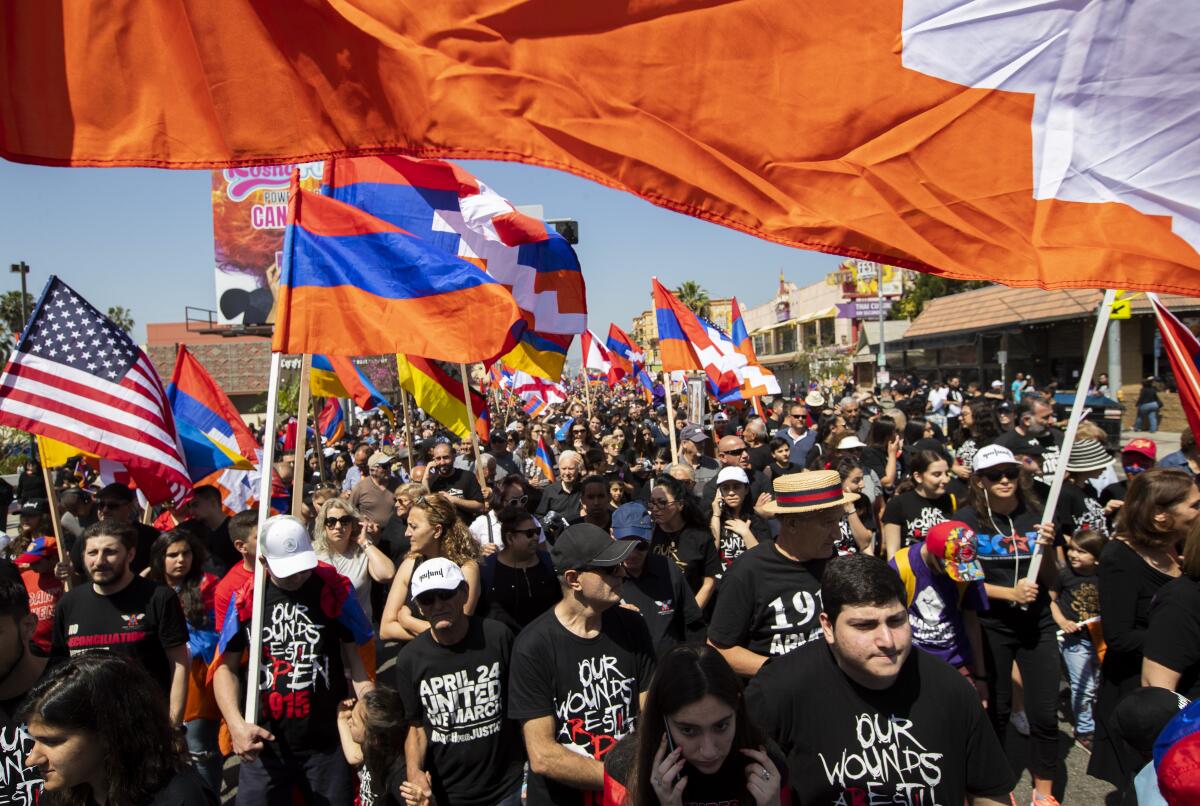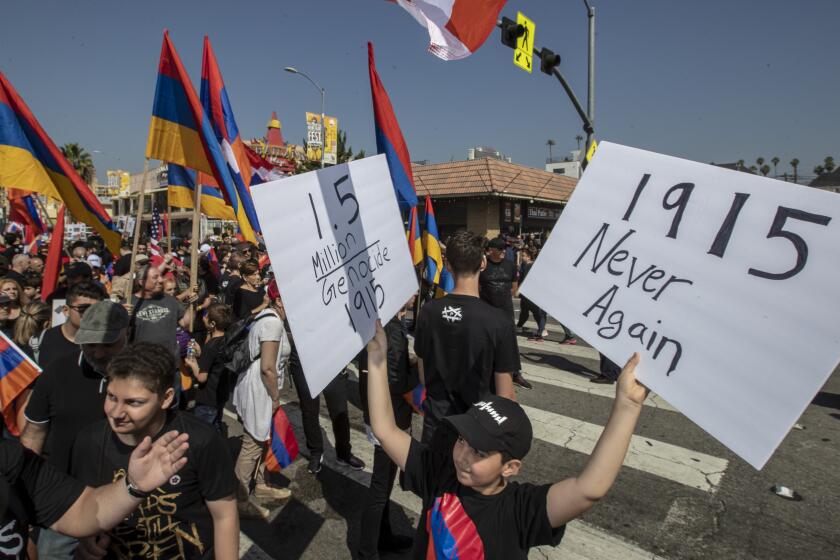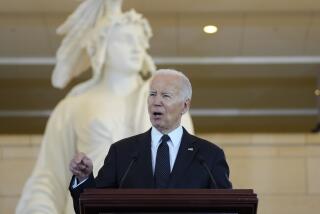Armenians spent their lives demanding U.S. recognition of genocide. Victory is here

- Share via
After 43 years of feeling a “certain way” — defined by the fight to have the massacre of her Armenian ancestors recognized as genocide — Lori Mesrobian isn’t sure what emotions will spring up if that actually happens.
For Mesrobian and other Armenians, what they consider a simple act of acknowledging history has faced decades of geopolitical barriers. U.S. politicians have made promises, only to pull back over the country’s strategic relationship with Turkey. There was great disappointment when President Obama, after pledging to recognize the genocide, ended up not taking that step.
For the record:
5:13 p.m. April 24, 2021A previous version of this story described the grandfather of Lori Mesrobian as growing up in an orphanage in Van, in what is now Turkey. He grew up in an orphanage in Lebanon after being expelled from Van.
Now, the United States has acted.
On Saturday, President Biden declared the Ottoman Empire’s killing of more than 1 million Armenians during World War I a genocide — making him the first sitting U.S. president to do so. It was a groundbreaking act, delivering on decades of hard-fought activism by Armenians around the world. Much of that movement has been centered in Southern California, home to America’s largest Armenian diaspora community and where genocide remembrance has long been a galvanizing force.
It was such a long time in coming some activists remained skeptical on Friday it would ever come to pass.
“It’s kind of like the Charlie Brown cartoon, with Lucy pulling the football away from Charlie Brown when he’s trying to kick it. That’s kind of how we feel right now,” said Stephan Pechdimaldji, 46. “It sounds promising, but until it happens, until he actually says it — then we’ll be at peace.”
“We’ve been burned before,” the Bay Area resident added.
RELATED: What’s behind Armenians’ long battle to secure a U.S. designation of genocide?
Armenians know it puts their community at a crossroads. Many have built their identities on fighting for recognition. There’s relief, but there’s also acute awareness that it’s only one step forward in a larger fight.
“When he utters those words, is that going to change my life? Is the trauma going to be lessened somehow? I don’t know,” Mesrobian, an assistant professor of Spanish at USC, said of Biden’s expected announcement.
Mesrobian was born into activism. As a 4-year-old, she attended genocide recognition rallies in the streets of Los Angeles, her hometown. As far back as her memory stretches, she recalls her family’s active participation in Armenian organizations.
Her maternal grandfather lost his family during the atrocities and grew up in an orphanage after leaving Van, in present-day Turkey. He never spoke about the violence, she said, but often spoke fondly of his community of fellow orphans, with whom he stayed in touch.
“My whole life has really been defined by this event in 1915,” said Mesrobian, her voice breaking, “because it’s really my family’s story.” That’s the year Ottoman authorities began rounding up and killing Armenian leaders in what is now Istanbul.
It’s a connection that hasn’t diminished among younger generations.
Tadde Matossian, 22, of Burbank, said those events during World War I “mean everything, to tell you the truth.”
His father’s family fled the Ottoman Empire, traveling through Syria before settling in Lebanon, where his father was born. Matossian is first-generation American but feels strong ties to Armenia, where he tries to visit as often as possible. Knowing that Mount Ararat — a national symbol of Armenia — is in eastern Turkey pains him.
“That takes a toll on your mental health,” he said. “Every action, of every day of my life, I want to find ways to help our community.”
Healing could begin, though not end, with recognition of genocide by the U.S., several diaspora members said.
For years, Salpi Ghazarian has worked to “prove that my grandmother’s story is not a lie.” The director of USC’s Institute of Armenian Studies, she grew up hearing traumatic stories from her grandmother, a survivor who fled as a refugee to Syria, where Ghazarian was born. She has spent years educating the public about the atrocities.
Putting the victims in the dual position of having to not only live with the trauma but explain it casts a shadow on the world’s values, she said. Recognition would offer a promise of respite.
“I don’t have to explain it anymore,” she said. “Not only has the world seen it, but now the U.S., among others, is actually saying — and hopefully doing — something about it.”
Linda Khachek, a 37-year-old Goleta resident who is the descendant of survivors, agrees that there’s something comforting about the prospect of naming the horrors.
During World War I, with all hope abandoned, Khachek’s great-grandmother left her grandfather, then an infant, in a Kurdish cemetery in Van. She hoped a family might take him in and spare him a worse fate. When her great-grandfather found out, he became upset and retrieved the baby.
Though her grandfather spoke little of his war-torn upbringing, Khachek grew up with the stories, passed down by her parents and the greater Armenian community on the East Coast, where she was raised. As a girl, she traveled every year to a genocide memorial sculpture near the Philadelphia Museum of Art on April 24, Armenian Genocide Remembrance Day.
“We’ve been an oppressed people, persecuted for hundreds of years, and I think for somebody to acknowledge that pain is really meaningful,” Khachek said. “It’s not going to give us closure per se, but it’s a great first step.”
Indeed, the fight is far from over.
Turkey has denied that the killings that took place more than a century ago amounted to genocide. Leaders have said there was widespread death of Christian Armenians but also of Muslim Ottomans and others during the fighting.
“At the end of the day, the important recognition is that by Turkey,” Ghazarian said.
Relations between the U.S. and Turkey, a NATO ally, have frayed in recent years. Biden’s announcement “is not going to help bilateral relations,” said Can Oguz, Turkey’s consul general in Los Angeles.
Turkish Americans living in California, and across the U.S., feel that their voices on the subject are discounted, according to Oguz.
“They are subjected to intimidation on some occasions when they want to share how they feel about this period in history, which is of course not in line with the Armenian view,” Oguz said. “It’s hard to reconcile with the freedom-of-expression standards in the United States.”
Recent events have brought fresh scrutiny to hostilities between Armenia and Turkey.
Armenian and Azerbaijani forces in September began fighting a bloody six-week war over a border region known as Nagorno-Karabakh, referred to by Armenians as the Republic of Artsakh. Azerbaijan, supported by its close ally Turkey, recovered significant territory it ceded to Armenia in a previous war over the region that ended in 1994.
U.S. Rep. Adam B. Schiff (D-Burbank), a longtime champion of genocide recognition who represents large diaspora communities, said he has spoken with members of the White House and Cabinet in recent weeks to underscore the importance of this happening now — in light of those events.
“Many fear that another genocide is possible — and this is not a matter of historic recognition alone,” Schiff said in an emailed statement. “If President Biden recognizes the Armenian Genocide, it will help deter other crimes against humanity by demonstrating that those who engage in mass murder will be held accountable.”
An annual protest demanding that Turkey recognize as genocide the events that began 106 years ago will go forward Saturday, as Armenians and supporters converge on the Turkish Consulate in Beverly Hills to make their voices heard.
Andy Kenareki, 32, saved the date on his calendar and already knows what he’ll wear: a shirt that reads “I want justice” in Armenian and a mask with the Armenian flag. The Glendale resident said the pandemic and prospect of U.S. recognition make this year’s event special, and he’s making a point of going now that he’s fully vaccinated.
Marches will continue until Turkey’s acknowledgment comes, he said, adding, “I also hope it’s kind of a joyous occasion and there’s some happiness and relief after a really terrible, terrible year, but also 106 years of just pain and no acknowledgement.”
Because of health concerns tied to the pandemic, Mesrobian won’t be attending the march, pausing a lifelong tradition. But if the recognition happens, she’ll celebrate with her children. One of her two sons is named Vano, a nod to Van, a source of pride for her grandfather. Khachek gave her daughter the middle name Vana in tribute to the same place.
“That seems like the best way to commemorate the day,” Mesrobian said. “To look at those kids and realize, we’re still here.”
More to Read
Sign up for Essential California
The most important California stories and recommendations in your inbox every morning.
You may occasionally receive promotional content from the Los Angeles Times.












